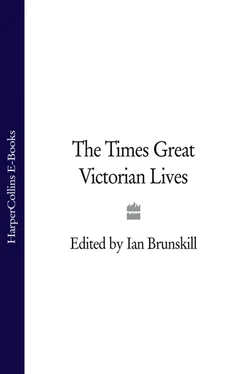Ian Brunskill - The Times Great Victorian Lives
Здесь есть возможность читать онлайн «Ian Brunskill - The Times Great Victorian Lives» — ознакомительный отрывок электронной книги совершенно бесплатно, а после прочтения отрывка купить полную версию. В некоторых случаях можно слушать аудио, скачать через торрент в формате fb2 и присутствует краткое содержание. Жанр: unrecognised, на английском языке. Описание произведения, (предисловие) а так же отзывы посетителей доступны на портале библиотеки ЛибКат.
- Название:The Times Great Victorian Lives
- Автор:
- Жанр:
- Год:неизвестен
- ISBN:нет данных
- Рейтинг книги:3 / 5. Голосов: 1
-
Избранное:Добавить в избранное
- Отзывы:
-
Ваша оценка:
- 60
- 1
- 2
- 3
- 4
- 5
The Times Great Victorian Lives: краткое содержание, описание и аннотация
Предлагаем к чтению аннотацию, описание, краткое содержание или предисловие (зависит от того, что написал сам автор книги «The Times Great Victorian Lives»). Если вы не нашли необходимую информацию о книге — напишите в комментариях, мы постараемся отыскать её.
The Times Great Victorian Lives — читать онлайн ознакомительный отрывок
Ниже представлен текст книги, разбитый по страницам. Система сохранения места последней прочитанной страницы, позволяет с удобством читать онлайн бесплатно книгу «The Times Great Victorian Lives», без необходимости каждый раз заново искать на чём Вы остановились. Поставьте закладку, и сможете в любой момент перейти на страницу, на которой закончили чтение.
Интервал:
Закладка:
Equally sincere and unbounded was the Emperor’s sympathy with the land which had witnessed his earliest exploits – Italy; and he never, perhaps, spoke more in earnest, never did greater justice to the generosity of his impulses, than when in 1859, calling upon the Italians to be men, he offered his help to free their country from the Alps to the Adriatic. The scheme of the Unity of the Peninsula did not, indeed, appear practicable to him any more than to some of the wisest and noblest Italian Liberals; and he, doubtless, conceived that the independence of Italy, although it might imply the complete severance of that country from Austria, need not therefore exclude some bond of alliance between the freed nation and its deliverer – a bond of alliance which might easily have been strengthened into a compact of indirect allegiance. In all this, however, the welfare of Italy, as he understood it, was the object nearest to the Emperor’s heart; and, with a self-denial of which, in trying moments, he never failed to give evidence, and with respect to which his cold and deliberate nature stands forth in strong contrast with the wilful and headlong character of his uncle, he gave up his own opinions in deference to those of the Italians; he accepted ‘accomplished facts,’ and not only never willingly opposed the spread and growth of Italian nationality, but actually screened it from the attacks to which, in its helplessness, it would repeatedly have succumbed.
True, he extinguished the Roman Republic in 1849; he exacted the cession of Savoy and Nice in 1860; he accepted from Austria the temporary gift of Venetia in 1866, and he re-occupied Rome in 1867. All these, however, were not the spontaneous acts of the Emperor’s own mind. He was influenced by what he considered due to French susceptibilities; to the claims of the Great Nation to her ‘natural frontiers;’ to her jealousy of her immediate neighbours; to her assumption of paramount authority as universal arbitrator; finally, to her half-chivalrous, half-selfish pretentions as Eldest Daughter of the Church. By most of these considerations he was also and much more forcibly moved in the policy he pursued with respect to Germany. That the instinct of Union was at work across the Rhine as well as south of the Alps the Emperor was fully aware, and he was also convinced that what the German nation firmly and unanimously willed it was not in the power of French jealousy to gain-say. He had been somewhat awed by the attitude of Germany, both in the full tide of his success after Solferino and in the furtherance of his designs in behalf of Poland and Denmark. It was not by opposing German Union, but by taking advantage of German disunion, that the Emperor hoped to secure the command. When the Germans had torn each other to pieces, when the victor lay on the battle-field as exhausted as the vanquished, to snatch from their grasp that Rhenish frontier which would free France from all uneasiness in that quarter would prove, as the Emperor conceived, no more impracticable an undertaking than it had been to rectify the border-line on the Italian side. The conditions which were peremptorily laid down at Plombières need hardly be as much as hinted at Biarritz. In Italy it was the help of France that was solicited. In Germany all that was required of her was neutrality. Mere looking on would do as much for her in the second case as stout fighting had done in the first. In all these calculations the Emperor relied on ‘the irresistible logic of events.’ But events were too quick for him. Germany achieved her unity in 1861; and France came in too late to claim her share of the spoil.
Before Sadowa and Nikolsburg the Emperor’s European policy appeared faultless in the eyes of the vast majority of the French people. But the first check naturally prompted a review of its course from the outset, and encouraged that criticism which is always extremely easy after the event. The main difficulty for the Emperor lay between conceding too much or too little to the warlike and domineering spirit of the French nation. The French had hailed with satisfaction the Bordeaux announcement of October, 1852, that ‘the Empire was Peace;’ but they were no less delighted with the subsequent assurance that ‘not a gun should be fired in Europe without the assent of the Tuileries.’ France had no objection that ‘the universe should be tranquil,’ but only on condition that ‘she herself should be contented.’ The Third Napoleon was called upon to exercise by mere moral ascendency that sway over the European councils which the First failed to establish by might of arms; and for many years there is no doubt that he acquitted himself of the task with unparalleled success. But he pressed that success beyond its due limits; he fretted himself about Congresses and Conferences, the only object or result of which was to be the enhancement of his own importance. There is no doubt that he suffered the notion that it was at all times necessary to busy and, so to say, to amuse the French people to gain too strong a hold upon his fancy. The scheme of diverting public attention from domestic affairs by distant expeditions to China, Japan, Syria, and, finally, to Mexico, had little to recommend it on the score of originality. The rulers who preceded Napoleon III had found a vent for the superfluous activity of French enterprise in Algeria, and it was only unfortunate that the gradual pacification of that colony should have deprived the Second Empire of a convenient safety-valve so near home. Most of the Emperor’s Quixotic undertakings beyond sea proved, as was to be expected, barren of results, but one, as might have been feared, turned out fatal. The project of a Mexican Empire, the scheme of the exaltation of the Latin races on the American continent, would have been sheer failures, even if the Emperor’s belief that the breach in the United States was incurable had been correct; for a European Power has little chance of obtaining a footing anywhere across the Atlantic, except as a tool in the hands of some of the native factions, and these turn out mere quicksands under those who would build upon them. But the result of the Mexican experiment was not brought even to this test. The Americans recovered sufficient strength to make a stand for the Monroe doctrine; and France had to back out of her Mexican position with a hurry in which her very dignity was not consulted.
Independently of success, however, it may be fairly admitted that the general tendency of the Emperor’s foreign policy was moderate and pacific; but it would not be equally easy to clear it altogether from the charge of disingenuousness and irresolution. The Emperor’s diplomacy was unlike that of any other man. No Sovereign ever came to the Throne with so large a crowd of ready-made agents and advisers; none attained power by so long a series of underhand manoeuvres. Louis Napoleon had been for half his life a conspirator. Necessity, no less than habit, made him a plotter on the Throne. Bent uponbringing into his hands all legislative and executive authority, upon exacting from all and each of his subordinates the fullest responsibility to himself alone, the Emperor had, properly speaking, no Ministers, but simply Heads of Departments, blind and passive tools to be taken up or cast off at his own pleasure. But, behind his responsible Cabinet, behind his acknowledged Council of State, there was always a little knot of more trusted and devoted instruments, chosen chiefly among the faithful followers of the Pretender’s obscure fortunes, men upon whom, in the gloomy isolation of absolute power, he must needs rely for his knowledge of that public opinion to which he denied all free utterance, and among whom he must seek such executors of his will as would rather guess than question his motives – men who would allow him all the merit of success, and take upon themselves all the blame of miscarriage; men between whom and himself there must be such a bond of freemasonry as to give them the intimate consciousness of their employers unfailing support, even under the cloud of his affected displeasure or the storm of his formal disavowal. It was in obedience to these necessities, created no less by the origin than by the nature of his government, that the Emperor, in his relations with foreign States, was frequently induced to give preference to indirect and clandestine negotiation; to intrust to extra-official agents messages un-meet for the conveyance of regularly accredited Envoys; to reserve for unwitnessed interviews the transaction of affairs of which no tangible document should be allowed to remain. Not satisfied with these not very dignified acts, which for some time established his credit for consummate dexterity, the Emperor also seemed to stake his reputation on a suddenness of action commensurate with his maturity of deliberation. He was perpetually taking the world by surprise. A Government ushered in by a Coup d’Etat was carried on by a succession of Coups de Théâtre. Whether a declaration of war was to be conveyed in a New Year’s greeting to a foreign Ambassador, or peace to be announced in an after-dinner speech to a Provincial Magistrate; whether the revelation of the Imperial mind was to take the shape of a mysterious pamphlet, or whether his mind was to be intimated in a familiar letter-the aim as well as the result invariably was to give the Emperor’s policy a ‘sensational’ character. ‘The Emperor,’ as his flatterers observed, ‘allows himself no rest.’ Perpetual activity and almost actual ubiquity seemed to be as indisputable attributes of an Imperial Providence as omniscience and omnipotence. Wherever the Emperor might go he must be in pursuit of some hidden object; his simplest act must proceed from some farfetched motive. A morbid expectation was created to which it daily became more difficult to minister. The Emperor’s speech and his silence were invested with an equally awful significance. Such overweening assumption must, however, be borne out by deeds of corresponding magnitude. The mere prestige of moral ascendency is soon brought to the test of material success. The world grew tired of all that solemn emphasis and oracular ambiguity. It looked for the results of all that profound statescraft, and saw it foiled by Cavour’s superior cunning; thwarted by Bismarck’s steadier resolve; it saw it wrecked against the Pope’s passive obstinacy; it saw it everywhere frustrated by the combination of unforeseen circumstances, by a series of irresistible catastrophes. It heard it acknowledging the force of a fatal necessity by alluding to the presence of dark spots on the horizon. And it was, be it observed, not so much to error of judgment as to infirmity of purpose that the repeated failures of the Emperor were imputed. Hesitation and inconsistency were the bane of his political conduct. He would have been equally powerful to create a United or a Federal Italy. He might as easily have upheld as pulled down the Papacy. He might have checked all Germany in the Danish War of 1864. He might have backed one-half of it against the other half during the seven weeks’ campaign of 1866. He might have done much less in Mexico, or he could have gone much greater lengths against the United States. His fault consisted in an excess of caution and circumspection. He seemed everywhere to arrive one day too late, and only to make up his mind when he had missed his opportunity. His Ministers were twitted in the Legislature by emboldened opponents, who asserted that there ‘was not one fault left for the Imperial Government to commit,’ and thus challenged them, as it were, to remain in office without a vital change in their policy. Two courses were open to the Emperor Napoleon after Sadowa – to make up by brute force what he had lost by unsuccessful manoeuvre, or else to acquiesce in the inevitable, to put a cheerful countenance on a losing game, and even to claim credit for a consummation which he had been unable to prevent. For nearly two years the Emperor wavered between the two resolutions. To rush into war before Nikolsburg or after Prague was declared to be impossible, owing to the unreadiness of the French military forces. Yet to accept and even to applaud the rise of a rival nation close on the Rhine frontier, especially after all that had been said about territorial compensations, natural boundaries, and popular aspirations, was, perhaps, to inflict too sore a wound on French susceptibilities. Hence there began that tentative, faltering, fidgeting policy; those abortive negotiations at Berlin, at the Hague, at Munich, at Vienna; those mysterious journeys and ominous interviews, which at first bewildered and dismayed, and at last half-amused, half-wearied Europe. At Paris and at Lille, the Emperor talked of peace. At Luxembourg, Salzburg, Copenhagen, he sought allies and nursed pretexts for war. Unequal to single-handed action, France affected to look for confederates. The real object was, if not to win partisans, at least to gain time; but both purposes were defeated. France revealed her unprepared condition at the same time that she widened and completed her isolation.
Читать дальшеИнтервал:
Закладка:
Похожие книги на «The Times Great Victorian Lives»
Представляем Вашему вниманию похожие книги на «The Times Great Victorian Lives» списком для выбора. Мы отобрали схожую по названию и смыслу литературу в надежде предоставить читателям больше вариантов отыскать новые, интересные, ещё непрочитанные произведения.
Обсуждение, отзывы о книге «The Times Great Victorian Lives» и просто собственные мнения читателей. Оставьте ваши комментарии, напишите, что Вы думаете о произведении, его смысле или главных героях. Укажите что конкретно понравилось, а что нет, и почему Вы так считаете.












